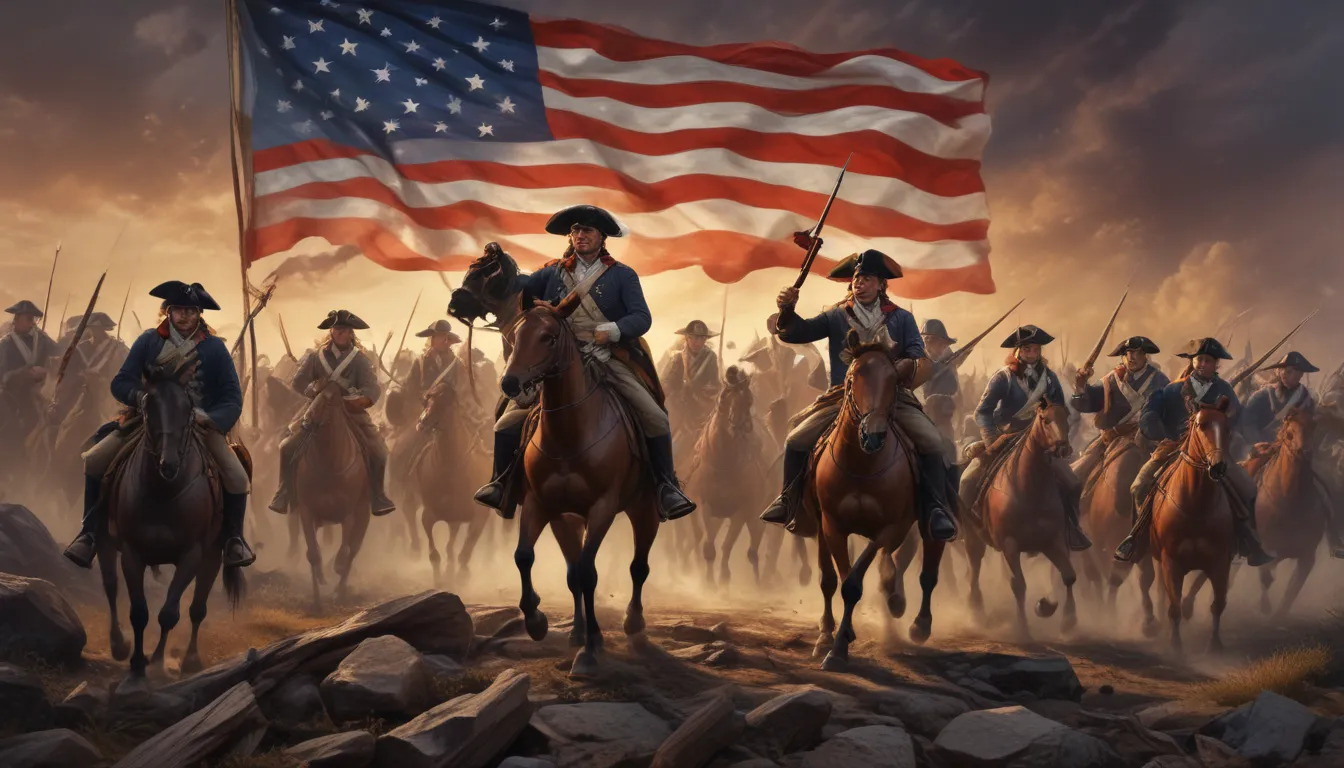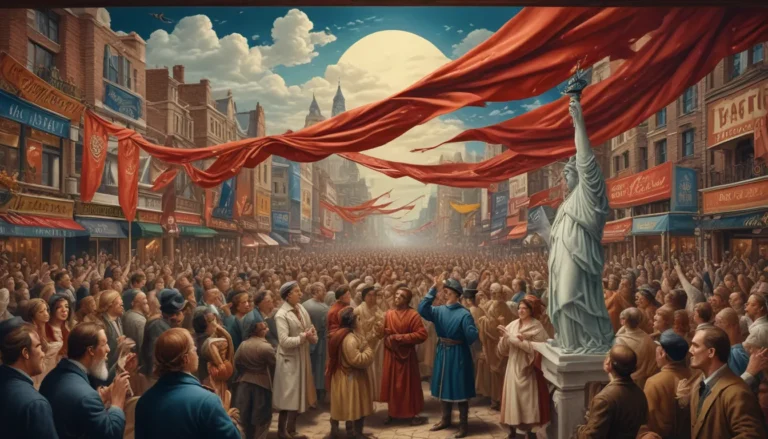The images in our articles may not match the content exactly. They are used to grab your attention, not to show the exact details in the text. The images complement the text but do not replace it.
Welcome to a captivating journey through the American Revolutionary War, a pivotal moment in history that shaped the birth of a new nation, the United States of America. Delve into the essential facts, intriguing details, and remarkable stories that define this revolutionary era. From the opening shots in Massachusetts to the final treaty in Paris, discover the key events, characters, and outcomes that forever altered the course of history.
The Spark of Conflict: The War Officially Started near Boston on April 19, 1775
The Revolutionary War began in the towns of Lexington and Concord on April 19, 1775, igniting a series of conflicts that would ultimately lead to the independence of the American colonies from British rule. Tensions had been brewing for years, fueled by events such as the Boston Massacre and the Boston Tea Party, which set the stage for the eruption of open warfare. The first shots fired that day marked the start of a long and arduous struggle for freedom.
From Local Dispute to Global Conflict: The Revolutionary War Was Actually a World War
What started as a colonial rebellion against British rule quickly escalated into a global conflict, drawing in major powers from around the world. France, Spain, the Dutch Republic, and the Kingdom of Mysore aligned themselves with the Colonists, while Britain enlisted German mercenaries and Native American allies. Battles raged not only in North America but also in Europe, Africa, India, and the Caribbean, expanding the theater of war far beyond colonial borders.
Beyond the Battlefield: The War May Have Claimed over 100,000 Lives
The Revolutionary War exacted a heavy toll in lives lost, with estimates suggesting that over 100,000 individuals may have perished during the course of the conflict. While combat casualties numbered in the thousands on both sides, the widespread impact of disease and harsh conditions took an even greater toll. The human cost of war was a stark reminder of the sacrifices made in the pursuit of freedom and independence.
George Washington: The Indispensable Leader of the Continental Army
At the heart of the American Revolutionary War stood George Washington, the revered Commander-in-Chief of the Continental Army. A veteran of previous conflicts, Washington brought skill, courage, and strategic vision to the battlefield, guiding the fledgling army through years of hardship and adversity. His leadership and determination inspired his troops and ultimately led to the triumph of the Colonists and their allies over the British forces.
Diverse Allegiances: Native Americans and Loyalists in the War
While some Native American tribes sided with the Colonists, a significant number chose to fight alongside the British, contributing to the complexities of the conflict. Loyalists, those who remained loyal to the British Crown, also played a role in the war, adding another layer of division and allegiance. Their presence on opposing sides further shaped the dynamics of the Revolutionary War and its outcomes.
Diplomatic Triumphs: Alliances That Altered the Course of War
The strategic alliances forged by Thomas Jefferson and Benjamin Franklin proved instrumental in securing victory for the Colonists. By cultivating relationships with powerful European nations such as France, Spain, and the Dutch Republic, the American forces gained crucial support and resources that tipped the balance in their favor. These diplomatic achievements solidified the Colonists’ position and helped shape the outcome of the war.
Commanders-in-Chief: British Leadership in the Face of Defeat
Throughout the course of the war, British forces were led by a series of Commanders-in-Chief, including Sir William Howe, Sir Henry Clinton, and Sir Guy Carleton. Each faced unique challenges and opportunities on the battlefield, from early victories to decisive defeats. Despite their efforts, the tide of war turned against the British, leading to their ultimate defeat and the recognition of American independence.
Founding Document: The Significance of the Declaration of Independence
At the heart of the Revolutionary War was the Declaration of Independence, a groundbreaking document that declared the 13 colonies’ separation from British rule. Crafted by visionary leaders such as John Adams and Thomas Jefferson, the Declaration laid the foundation for a new nation, the United States of America. Its ideals of liberty, equality, and self-governance remain central to the American identity to this day.
Divided Loyalties: The Complex Landscape of Colonial Support
Despite the eventual success of the rebellion, the American colonies were deeply divided during the Revolutionary War. While a significant portion of the population supported the Patriots and their cause, a sizable minority remained loyal to the British Crown. Others sought to remain neutral, navigating a complex and challenging landscape of shifting allegiances and political loyalties.
Path to Peace: The Treaty of Paris in 1783
The formal end of the Revolutionary War came with the signing of the Treaty of Paris in 1783, a momentous event that solidified American independence and marked the beginning of a new chapter in history. Representatives from both sides, including John Adams, Benjamin Franklin, and John Jay, gathered to formally end hostilities and establish the groundwork for lasting peace. The treaty’s provisions set the stage for the emergence of the United States as a sovereign nation on the world stage.
Uniting a Nation: George Washington’s Legacy of Leadership
In a defining moment of unity and statesmanship, George Washington quelled the Newburgh Conspiracy rebellion within the Continental Army through his inspirational leadership. Meeting with disgruntled officers, Washington dispelled the threat of mutiny with a powerful and heartfelt address, highlighting his unwavering commitment to the principles of democracy and the rule of law. His actions solidified his reputation as a leader of remarkable integrity and foresight.
Innovations and Contributions: Remarkable Stories of the Revolutionary War
The Revolutionary War was a time of innovation and daring, with notable achievements that shaped the course of history. From the use of the first military submarine to the involvement of women in combat roles, the war showcased the resilience and resourcefulness of those involved. Benedict Arnold’s pivotal contributions, the bravery of women like Molly Pitcher and Margaret Corbin, and Washington’s legendary stature all added to the tapestry of the conflict.
Unraveling Myths: The Legacy of the Revolutionary War
As we reflect on the Revolutionary War and its enduring legacy, we dispel myths and uncover the truth behind iconic moments in history. From the real story behind the Boston Tea Party to the complexities of colonial loyalties, we uncover the nuanced and multifaceted nature of this pivotal period. By revisiting the facts and stories of the war, we gain a deeper understanding of the challenges, triumphs, and sacrifices that defined the birth of a nation.
Conclusion: Exploring Revolutionary War Facts and Insights
As we journey through the events and characters of the American Revolutionary War, we gain a deeper appreciation for the complexities and significance of this transformative era. From the courage of soldiers on the battlefield to the diplomatic maneuvers that reshaped the course of history, each aspect of the war offers valuable insights and lessons for us today. By exploring Revolutionary War facts and delving into its rich tapestry of stories, we connect with the spirit of those who fought for freedom and independence, leaving an indelible mark on the world.






